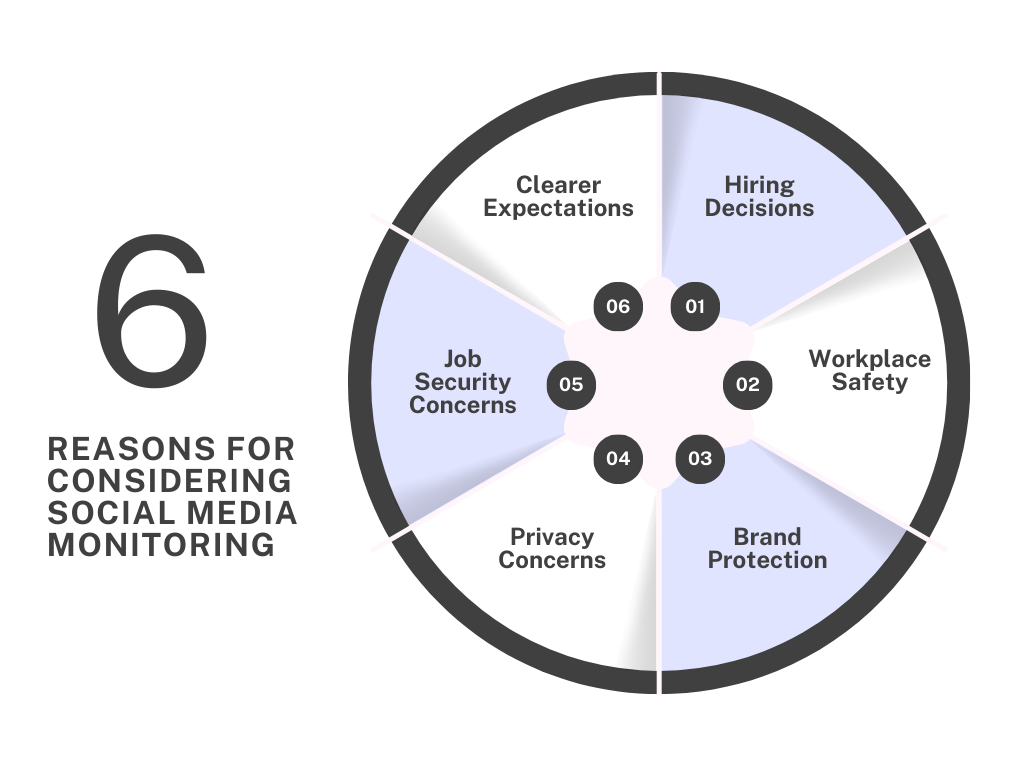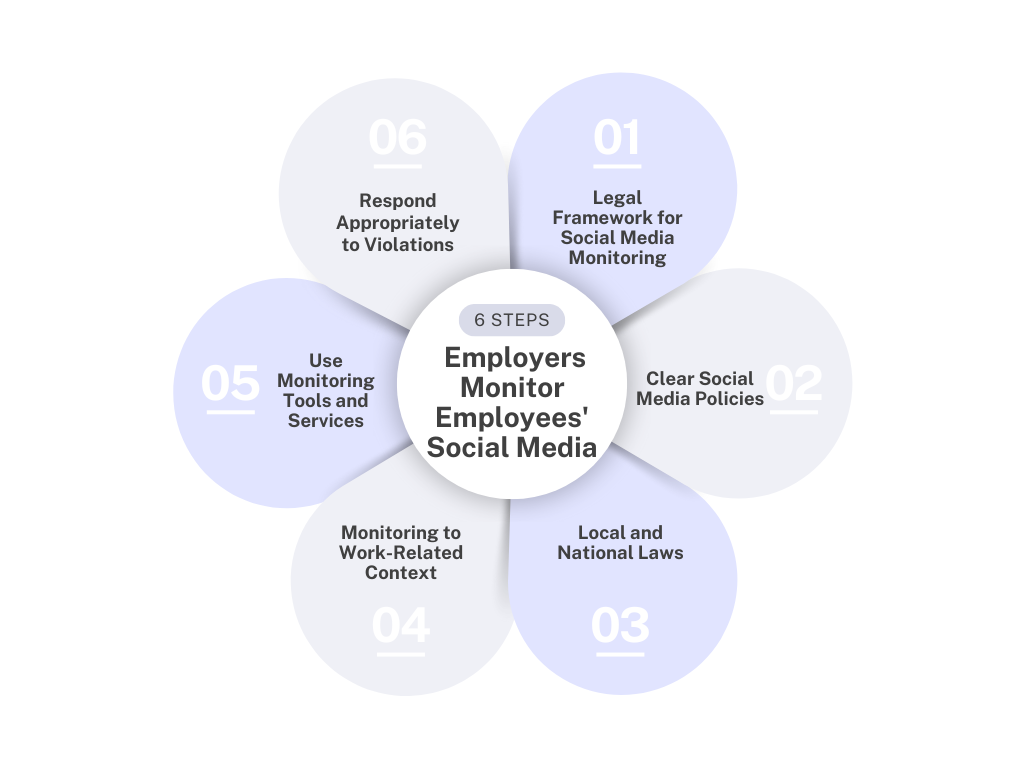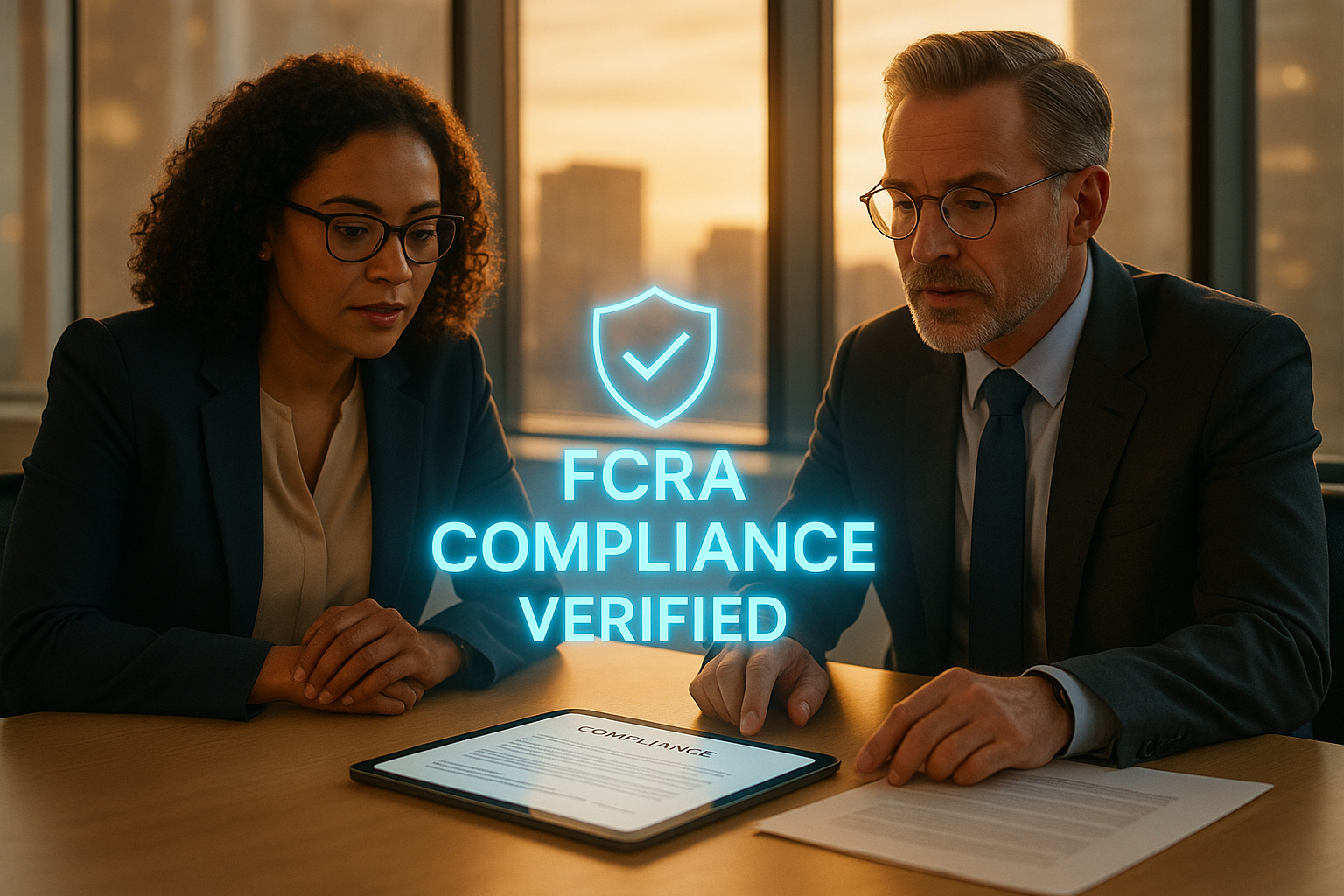How Do Employers Legally Monitor Employees' Social Media?

Social media is a common part of daily life, but problems arise when employees use work hours and devices for it. This can lead to the sharing of private company info or harmful behavior, impacting the organization and colleagues.
For employers, social media monitoring in the workplace can offer a way to evaluate candidates, protect the company's brand, and ensure a safe and respectful workplace.
Employers are increasingly discovering employee misconduct through social media posts. What actions are they allowed to take, what are the limits, and what should they consider when using these posts?
Ethically, monitoring social media is tricky. Employers may check posts for company protection, but must avoid retaliating against employees for discussing work conditions, which is protected by the National Labor Relations Board (NLRB).
This article will explore how employers can legally monitor employees' social media accounts inside or outside the workplace, as well as the benefits and risks involved. We will also provide practical tips and best practices for implementing effective social media screening while ensuring compliance with privacy laws.
Is it legal for Employers to Monitor Employee Social Media Accounts?

Social media use has grown significantly, leading employers to question whether they can monitor or restrict employees' online discussions about work. Systematic monitoring of an employee's social media posts is generally prohibited in some states, regardless of whether the platform is professional or personal, as it involves processing personally.
But, employers can review individual posts if they suspect an employee has breached their contract, based on information from another employee. The processing of personal data is considered proportionate, as employees have less protection over public posts, according to the GDPR.
While employers can regulate employee behavior during work hours and prevent illegal activities, the rules are less clear when it comes to monitoring personal social media use. The National Labor Relations Board (NLRB) protects employees' rights to discuss wages, working conditions, and union activities online, but individual complaints are generally not protected. Employers must be cautious when creating policies, as the legal landscape continues to evolve, and professional guidance is recommended.
Monitoring public accounts is generally allowed, but accessing private content requires consent. Employers should focus on work-related issues, and respect privacy rights and employees have the right to post freely outside work hours without employer tracking.
Laws differ by region, and employers must ensure their practices align with regulations like the Electronic Communications Privacy Act (ECPA) or General Data Protection Regulation (GDPR).
Employers can use information from social media posts as evidence, even if obtained unlawfully, as long as it doesn’t violate the employee's fundamental rights. The Federal Labour Court has ruled that such evidence can be considered in court based on the right to be heard and free evidence assessment.
Why Employers Consider Social Media Monitoring?

Social media platforms like Facebook and LinkedIn are still evolving in terms of employment and privacy regulations. However, a Pew Research Center study found that 34% of employees use social media during work hours to take a mental break.
Employers consider social media monitoring for several important reasons that impact both the workplace environment and the company's broader reputation. By monitoring employees' social media activity, employers can make more informed decisions and address potential risks before they escalate. Below are some of the key reasons why employers might monitor social media:
1- Hiring Decisions:
Employers often use social media monitoring as part of the hiring process. Social media platforms can offer valuable insights into candidates' personalities, interests, and behavior that may not be apparent from resumes or interviews.
For example, an employer might check for red flags like inappropriate language, discriminatory behavior, or evidence of illegal activities. Social media checks help employers assess whether a candidate's values align with the company's culture.
2- Workplace Safety:
Employees sometimes share posts about their work environment or specific job-related experiences. Monitoring these posts can help employers identify potential safety concerns, harassment, or toxic behaviors that could negatively impact the workplace.
Posts about workplace accidents or safety violations can alert employers to risks they may not have been aware of.
3- Brand Protection:
An employee’s social media presence can impact the company’s reputation, especially if the employee posts negative or inappropriate content. For instance, a post that disparages the company, its products, or colleagues could quickly go viral and damage the company’s public image. By monitoring social media, employers can act swiftly to address any content that might harm their brand.
4- Privacy Concerns:
Employees might accidentally or intentionally share confidential company information on social media. By monitoring social media activity, employers can spot leaks of sensitive data or breaches of confidentiality that could lead to legal problems. This is especially important in industries dealing with intellectual property or private customer data.
Employers may also use social media posts to verify if a sick employee is actually on vacation or to address issues like defamation or data leaks. In these cases, an employee's social media profile can offer useful information.
5- Job Security Concerns:
Social media monitoring can help employers spot signs of dissatisfaction or disengagement among employees. If an employee is posting complaints about their job or sharing negative experiences online, it could signal potential issues that need to be addressed. In some cases, monitoring can even prevent employees from engaging in activities that could harm their careers, such as venting frustration in a public forum or making threats online.
6- Clearer Expectations:
Employers may use social media monitoring to ensure that employees are adhering to the company’s code of conduct and following established policies regarding online behavior. By monitoring social media, employers can reinforce expectations for professional conduct, particularly when it comes to sharing work-related information, engaging with the public, or representing the company online. Monitoring can also help employers maintain consistency in enforcing their social media policies.
How Do Employers Monitor Employees' Social Media?

Monitor employee social media activity, focusing on posts, comments, and edits to prevent leaks of sensitive information, such as intellectual property updates. Watch for signs of dissatisfaction that could indicate an increased insider risk.
Ensure social media isn't being misused for inappropriate behavior during work hours. Additionally, identify employees who support colleagues through chat collaboration, as they may be hidden leaders worth promoting.
Employers must navigate several legal and ethical considerations when monitoring employees' social media profiles. Below are key practices employers should follow.
1. Understanding the Legal Framework for Social Media Monitoring
Privacy Laws: Employers need to follow privacy laws when monitoring social media. These laws differ by country and region, but they usually aim to stop employers from invading employees' personal lives. Before monitoring social media, employers should know their legal responsibilities.
Employee Consent: In many cases, employees must consent to monitoring, either through an agreement or a clause in their employment contract. Obtaining consent helps ensure compliance with legal requirements and fosters trust between employers and employees.
Transparency and Policies:
To avoid legal issues, employers should have clear policies outlining their social media monitoring practices. These policies should explain:
- What will be monitored (public posts, comments, messages, etc.).
- Why monitoring is necessary (to protect confidential data, prevent misconduct, etc.).
- How the information will be used and safeguarded.
Employers should share these policies during onboarding and update them regularly to reflect changes in laws or company practices.
2. Establishing Clear Social Media Policies
A well-defined social media policy ensures employees understand their rights and responsibilities when using social media, both inside and outside the workplace. Clear communication about monitoring practices can prevent misunderstandings and provide legal protection for the employer.
The policy should define acceptable online behavior, ensuring it aligns with business needs and avoids overly broad restrictions on employees' rights to discuss workplace issues. Employees should be reminded to protect sensitive company information, as once posted, it can be difficult to remove. The policy must also comply with privacy, discrimination, and defamation laws, and employers should educate employees about the policy’s purpose and consequences for violations.
Create a social media policy to protect your business from risks posed by online posts and Inform employees that the company may monitor public posts and encourage them to keep personal content private. Focus monitoring on illegal activities like harassment or discrimination, not personal details. Avoid asking employees to promote the company on personal accounts or use branded images.
3. Respect Local and National Laws and Employees' Privacy Rights
Employers need to follow local, national, and international laws when monitoring employees' social media activity. Different regions have specific rules to protect employee privacy. For example:
- United States: Federal and state laws, like the Stored Communications Act (SCA), limit access to employees' private social media content.
- European Union: The General Data Protection Regulation (GDPR) requires employers to balance monitoring with protecting privacy rights.
- Canada: Laws like the Personal Information Protection and Electronic Documents Act (PIPEDA) ensure employees' data is handled fairly and transparently.
Employers should also respect any guidelines set by labor unions or industry regulators. Violating these laws can lead to penalties, lawsuits, or damage to company's reputation. Ensuring lawful and respectful monitoring helps maintain employee trust and avoids legal risks.
4. Limit Monitoring to Work-Related Context
Employers should focus on monitoring content that is relevant to the workplace. Monitoring personal posts unrelated to work can lead to unnecessary legal and ethical issues. Social media checks should be confined to work-related behaviors, such as violations of company policies or inappropriate conduct.
Be cautious when reacting to personal or work-related posts, employee complaints about work conditions may be protected by the NLRB, and any retaliation, like discipline or termination, is prohibited. Avoid addressing personal issues unless the employee has directly shared them with you.
5. Use Monitoring Tools and Services Appropriately
Employers can use third-party tools or services like Ferretly to monitor social media activity efficiently and responsibly. Ferretly offers AI-powered solutions that automate social media screening, helping identify potential risks such as data leaks, misconduct, or reputational concerns. These tools ensure consistent monitoring while reducing human bias.
To maintain compliance with legal standards when using tools like Ferretly:
- Choose trusted tools that follow privacy laws and data protection regulations.
- Focus on relevant content, such as public posts or activities that may impact the workplace, and avoid accessing private messages or personal content.
- Be transparent by informing employees about the monitoring process, tools used, and reasons for monitoring.
- Regularly review and update monitoring practices to stay aligned with changing laws and company policies.
Using tools appropriately allows employers to protect their business while respecting employees’ privacy rights.
6. Respond Appropriately to Violations
When a violation occurs, employers must address it quickly and professionally. This might include counseling, discipline, or other actions according to the company's policies. It's crucial that responses are fair, proportionate, and aligned with the organization's values.
Read Also: How do Social Media Background Checks Work
What Can Employers Legally Monitor on Social Media?
Employers can only legally monitor specific aspects of employees' social media activity. The following areas are typically fair game:
- Social Media Public Profiles Only: Employers can monitor publicly available information on social media profiles. If an employee's account is set to private, the employer must respect the employee's privacy rights and cannot request access without consent.
- Consent Requirements: Employees must be informed and give consent before their social media profiles are monitored. This is often achieved through an employment contract or company policy.
- Content Related to the Company or Job: Employers are within their rights to monitor social media posts that directly relate to the company or the employee's job. For example, comments on work performance, company policies, or client relationships may be monitored to ensure they align with company standards.
- Social Media Activity That Violates Company Policies: Any social media posts that violate company policies can be monitored and addressed. This includes activities like harassment, sharing confidential information, or promoting inappropriate behavior.
- Work-Related Communication: Employers can monitor communication regarding work matters, even if it occurs through private social media channels, provided there is a valid reason related to workplace safety, security, or performance.
- Employee's Public Advocacy or Online Reputation: Employers have an interest in monitoring public online activities that may affect the company's reputation. This includes checking for any advocacy or public statements that could reflect poorly on the organization.
Using tools like Ferretly for automated social media screening can help ensure that monitoring remains compliant, consistent, and fair while protecting both the company's and employees’ rights.
Benefits for Employers Monitoring Social Media
Many employers check social media—90% review candidates' accounts, and 79% have dismissed candidates based on what they found and a CareerBuilder survey shows 57% are less likely to interview candidates without an online presence. Employers also monitor employees' social media to protect their reputation, as a single negative post can harm the business.
Some employers worry about the risks of monitoring social media but use AI-driven third-party services to screen for red flags without manually reviewing posts. These tools help businesses focus on potential issues, like leaks of sensitive information, while avoiding irrelevant content. With the risks of damaging posts—such as inappropriate content or negative remarks—businesses must monitor social media to protect their reputation and brand integrity.
Social media monitoring provides several advantages for employers, including:
- Protecting Company Reputation: Employers can spot potential issues before they escalate by monitoring employee posts about the company. This proactive approach helps maintain a positive public image.
- Preventing Workplace Harassment and Discrimination: Monitoring helps identify inappropriate behavior, such as harassment or discriminatory comments, ensuring that the workplace remains safe and inclusive for all employees.
- Mitigating Risks and Legal Liabilities: Employers can mitigate risks related to workplace misconduct or violations of company policies by monitoring social media activity. Identifying issues early can help prevent costly legal consequences.
- Improving Hiring and Recruitment Processes: Social media provides insight into a candidate's background, behavior, and personality, which can enhance the recruitment process. It helps employers ensure that new hires align with company values.
- Boosting Productivity: Employers can use social media monitoring to assess how employees are spending their time and encourage productivity. Identifying patterns of excessive personal social media use during work hours helps companies maintain focus.
- Brand Ambassadorship: Employees are often the best brand ambassadors. Monitoring social media helps employers ensure that their employees are representing the company in a positive light.
- Responding to Crisis or Issues: Social media is an essential communication channel during a crisis. Monitoring employee posts allows employers to react quickly and prevent further damage.
- Supporting Employee Well-being and Engagement: Social media monitoring can also provide insights into employee satisfaction and morale. Employers can address issues early and create a better work environment.
- Boosting Recruitment and Brand Advocacy: Social media helps employers connect with potential candidates and build brand loyalty. By monitoring employee activity, employers can identify potential brand advocates who can help attract new talent.
Social media can boost your business by engaging customers, driving traffic, and building brand awareness. Employees can also help as brand ambassadors, but there are risks. Employers can be held liable if employees post false statements or rumors, potentially leading to defamation claims.
Learn more about how Ferretly's social media screening services can help your business protect its reputation and streamline your recruitment process.
Read Also: Benefits of Social Media Screening
The Risks of Improper Social Media Monitoring
State laws protect social media privacy, preventing employers from accessing private accounts without consent. However, if information is publicly posted, employers can view it but must still follow rules.
Employers must avoid discrimination based on personal details like sexual orientation or pregnancy, and must comply with the Fair Credit Reporting Act when using social media for background checks.
Off-duty conduct laws in some states protect applicants from discrimination based on legal activities, such as political views or alcohol use, discovered via social media.
Although social media monitoring has its advantages, improper practices can lead to significant risks.
- Privacy Violations: Failure to respect privacy boundaries can result in legal actions and damage to the employer-employee relationship.
- Increase Hiring Bias and Discrimination: Monitoring social media profiles can inadvertently lead to bias, especially if an employer makes hiring decisions based on irrelevant personal factors like race, gender, or lifestyle choices.
- Reputational Damage: If an employer is perceived as excessively monitoring employees' personal lives, it can harm the company's reputation. Transparency and fairness are key to avoiding such damage.
- Legal Consequences and Lawsuits: Violating privacy rights or failing to follow appropriate social media monitoring laws can result in costly lawsuits or government penalties.
- Damage to Employer-Employee Trust: Excessive monitoring can erode trust between employers and employees. Striking the right balance between safety and privacy is essential.
- Increased Risk of Retaliation: Employees may retaliate against what they perceive as an invasion of their privacy, leading to issues such as whistleblowing or public complaints.
- Reputation Damage: Improper monitoring practices can lead to negative publicity, particularly if employees feel that their privacy has been invaded.
- Chilling Effect on Free Speech: Excessive social media monitoring can discourage employees from expressing themselves freely, leading to a less open and communicative work environment.
- Inconsistent Monitoring Practices: If monitoring is inconsistent, it can create confusion and resentment among employees. Employers must apply monitoring policies uniformly across the workforce.
- Wasted Time and Resources: Monitoring social media can be resource-intensive. Employers must ensure that the effort put into monitoring is worthwhile and not detracting from more important business activities.
By using Ferretly for social media monitoring, employers can reduce the risks associated with improper monitoring while ensuring legal compliance, fairness, and efficiency in their practices.
Monitoring Employee Social Media Activity in Event-Related Situations
In certain event-related situations, such as during a workplace crisis, a public relations issue, or a major company announcement, employers may need to adjust their social media monitoring practices. These situations often require immediate attention and action. Monitoring employees' social media activity during these times can help ensure that employees are not inadvertently contributing to the crisis or spreading inaccurate information.
This can help identify employees who may be posting inappropriate content, spreading rumors, or engaging in behavior that could escalate the situation. It also ensures that employees remain compliant with internal policies during stressful or highly public events.
However, employers should approach event-related monitoring with caution, as it can potentially infringe on employees' rights or create further tensions in the workplace. Being transparent about monitoring during such events and adhering to legal guidelines is crucial to prevent backlash or legal complications.
Best Practices for Effective Social Media Monitoring
Evaluating an employee's social media posts can be a valuable tool for proving a breach of contract and preparing for potential dismissal disputes. However, employers must ensure the evaluation remains proportional and limited to specific posts. It is also recommended to document the reasons for and scope of the review, as well as the assessment of the posts, to justify the legitimacy of the data processing if needed later.
To ensure social media monitoring is done ethically, effectively, and legally, employers should follow these best practices:
- Use a Third-Party Screening Service: Using a third-party screening service like Ferretly can help automate the process, ensuring consistency and compliance with legal requirements. These services are often equipped with advanced technology, such as AI, to accurately analyze and monitor social media profiles while minimizing human error.
- Set a Clear and Transparent Social Media Policy: A clear social media policy is essential for establishing boundaries and setting expectations. Employees should understand the types of content that may be monitored and the potential consequences of violating the policy. Regularly updating this policy ensures that it aligns with current laws and best practices.
- Be Transparent About Monitoring Practices: Transparency is key in fostering trust between employers and employees. Employers must inform employees when processing their data including including which social media platforms will be monitored and the type of data that will be analyzed, which helps avoid misunderstandings and potential legal issues. However, exceptions apply, such as when providing information is impossible, disproportionate, or could affect legal claims. A case-by-case review is necessary, and legal advice may be needed.
- Focus on Relevant Issues: Employers should focus on monitoring social media content that directly affects the workplace or the company's reputation. It's essential to avoid overreaching into employees' personal lives and only monitor posts that are work-related or violate company policies.
- Maintain Fairness and Consistency: Social media monitoring should be applied fairly and consistently across all employees. Employers must avoid selective monitoring based on personal bias or favoritism. A standardized approach helps ensure that all employees are treated equally and that the process is perceived as just.
- Focus on Public Information and Work-Related Risks: Employers should monitor public posts, as private posts require consent for access. The focus should be on identifying work-related risks, such as violations of company policies or posts that could damage the company's reputation.
- Use Monitoring Tools Ethically: Monitoring tools and services should be used ethically, ensuring that employees' privacy rights are respected. Employers must refrain from using intrusive tactics or violating employees' personal space.
- Respect Employee Privacy and Free Speech: Employers must strike a balance between monitoring work-related issues and respecting employees' privacy and free speech rights. Employees should feel free to express themselves outside of the workplace without fear of retaliation.
- Train Managers and HR Professionals: Employers should train managers and HR professionals on the ethical and legal implications of social media monitoring. Ensuring that those in charge of monitoring practices understand the risks and legal obligations is crucial for maintaining compliance.
- Regularly Review and Adjust Monitoring Practices: Social media policies and monitoring practices should be reviewed regularly to ensure that they remain up to date with evolving laws and technologies. Adjusting practices as needed helps ensure that monitoring remains relevant and compliant.
Real-world Use Cases for Social Media Monitoring
Social media screening is used in various industries to improve hiring, enhance workplace safety, and maintain compliance. Below are some common use cases where social media monitoring plays an important role:
- Education: Schools and universities often use social media monitoring to screen applicants for teaching positions. Teachers and staff members may be scrutinized for inappropriate behavior or statements on social media that conflict with the institution's values.
- Law Enforcement: Law enforcement agencies may use social media monitoring during the hiring process to assess the character of potential recruits. In addition, social media screening is often used to ensure that active officers do not engage in behavior that could tarnish their agency's reputation.
- Gig Economy: For gig economy companies, social media screening is increasingly used to vet independent contractors and freelancers. This helps ensure that workers align with the company’s standards and public image.
- Hiring and Recruitment: Social media screening is a critical part of the recruitment process, as it helps employers identify red flags that may not be apparent in an interview. This can include checking for harmful or inappropriate behavior that could pose risks in the workplace.
- Influencer and Brand Ambassador Screening: Companies that hire influencers or brand ambassadors often use social media monitoring to assess the public personas of potential partners. This helps ensure that the individuals align with the company's image and values before entering into any contracts.
- Employee Monitoring and Workplace Behavior: Employers in various industries monitor employee social media activity to maintain a safe and respectful workplace. Social media monitoring can help identify potential workplace issues, such as bullying, harassment, or behavior that violates company policies.
Read Also: Do Colleges Look at Social Media
How Employees Can Protect Their Social Media Privacy?
Employees also have a responsibility to protect their own social media privacy. Below are several practical steps employees can take to safeguard their personal information:
- Adjust Privacy Settings: Employees should regularly review and update their social media privacy settings to limit access to their personal posts. Limiting access to only trusted connections can help prevent unwanted monitoring.
- Separate Personal and Professional Accounts: Creating separate accounts for personal and professional use helps avoid potential issues with employers monitoring personal posts. Employees should reserve professional accounts for work-related interactions only.
- Be Mindful of What Employees Share: Employees should be mindful of the content they post, as social media activity is often publicly accessible. Avoiding controversial or sensitive topics on social media can prevent potential conflicts with employers.
- Use Strong Passwords and Two-Factor Authentication (2FA): Protecting social media accounts with strong passwords and two-factor authentication can prevent unauthorized access and protect personal data.
- Be Aware of Third-Party App Permissions: Employees should regularly check which third-party apps have access to their social media accounts and remove any unnecessary permissions. This helps maintain control over who can access personal information.
- Be Cautious with Job-Related Content: Employees should avoid posting work-related content that could be considered confidential or sensitive. Maintaining a clear boundary between personal and professional content reduces the risk of issues arising from social media monitoring.
- Understand Employers’ Social Media Policies: Employees should familiarize themselves with their employer's social media policies to understand what is acceptable and what could lead to disciplinary actions.
- Avoid Mixing Social Media with Work Communication: Employees should avoid discussing work-related matters on personal social media accounts to maintain clear boundaries between personal and professional lives.
- Regularly Clean Up Old Posts: Employees should periodically review and delete old posts that could be considered controversial, inappropriate, or irrelevant to their current professional standing.
- Monitor Your Online Reputation: Employees should proactively monitor their online reputation by regularly searching for their names on search engines to ensure there are no embarrassing or inappropriate posts.
How Ferretly Simplifies Social Media Screening For Monitoring Employee
Ferretly offers AI-powered social media screening solutions that help employers efficiently and legally monitor employees' social media activity. By automating the process and focusing on relevant content, Ferretly ensures compliance with privacy laws while providing actionable insights for HR professionals and managers.
- AI-Powered Analysis: Ferretly uses advanced AI technology to analyze social media profiles, ensuring accurate assessments while maintaining legal compliance.
- Fast Results: Ferretly provides quick, actionable reports, enabling employers to make informed decisions during hiring or workplace assessments.
- Continuous Monitoring: Ferretly's continuous monitoring service helps employers stay up to date on employees' social media activity, providing real-time alerts for potential risks.
- Compliance and Privacy: Ferretly ensures that all social media screening practices comply with privacy laws and regulations, offering a secure and legally sound solution.
For a demonstration of how Ferretly can simplify your social media screening, request a demo today and see how our AI-powered solutions can benefit your organization.
Frequently Asked Questions
1- Can employers take pictures of employees without their knowledge
No, employers generally cannot take pictures of employees without their knowledge or consent, as it may violate privacy rights. In many jurisdictions, employees have the right to expect privacy in the workplace, and unauthorized photography could be considered an invasion of privacy.
However, there may be exceptions in specific circumstances, such as for security purposes (e.g., surveillance cameras in common areas). Employers must also ensure compliance with local laws and regulations, including obtaining consent if required. It's always advisable for employers to establish clear policies regarding the use of cameras or photography in the workplace.
2- Should Employers Monitor Employees' Social Media?
Monitoring employees' social media is a business decision that should align with the company's values and legal obligations. It can offer significant benefits, such as protecting the company's reputation and ensuring compliance with workplace policies.
3- What Types of Posts Are Flagged During Social Media Checks?
Posts related to workplace misconduct, violations of company policies, inappropriate content, or anything that could harm the company's reputation are typically flagged during social media screening.
4- How Long Does It Take to Get a Report from Ferretly?
Ferretly typically provides social media screening reports within a few hours to a few days, depending on the scope of the monitoring.
5- What Industries Benefit Most from Social Media Screening?
Industries such as education, law enforcement, gig economy, and recruitment benefit significantly from social media screening. It helps ensure that candidates align with the company's standards and that employees' behavior meets expectations.
6- Should Employers Inform Employees About Monitoring Their Social Media?
Yes, employers should inform employees about the monitoring process to foster transparency and ensure compliance with privacy laws. Having a clear policy in place helps manage expectations and builds trust.
7- Is Social Media Screening Legal?
Yes, social media screening is legal when done in accordance with applicable laws, including privacy regulations and employee consent requirements. Employers must ensure that their monitoring practices respect employees' rights.
Conclusion
Social media use by employees can both enhance collaboration and productivity, but it may also lead to distractions. While employees who engage with social media are often more engaged, they are also at a higher risk of leaving their jobs for new opportunities.
Developing a social media policy should involve surveys and focus groups to balance its benefits with the risks, especially regarding harassment or discrimination. Employers should be cautious when monitoring social media, as First Amendment protections apply differently to public and private sector employees.
While federal law does not prohibit employers from monitoring social media, transparency in monitoring practices and clear guidelines on acceptable use are essential. Policies must respect employees’ rights, including their right to discuss working conditions under the National Labor Relations Act. Employers should also educate employees on the importance of protecting proprietary information and complying with privacy laws.






